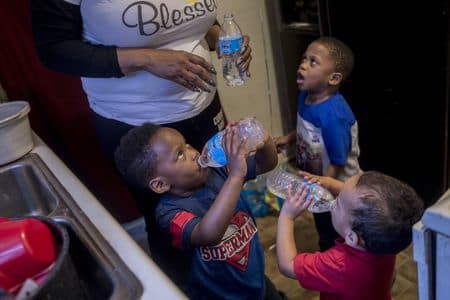
After 18 months of litigation, the state of Michigan has made its largest settlement in history to compensate the victims of the Flint water crisis. Last week, Gov. Gretchen Whitmer and Attorney General Dana Nessel announced that the state would be issuing $600 million to Flint residents impacted by lead poisoning between April 25, 2014 and July 31, 2016.
“This settlement focuses on the children and the future of Flint, and the state will do all it can to make this a step forward in the healing process for one of Michigan’s most resilient cities,” Nessel said in a statement. “Ultimately, by reaching this agreement, I hope we can begin the process of closing one of the most difficult chapters in our state’s history.”
Distribution of the settlement will be based on the age of the injured for those under 18 years of age. About 80 percent or $480 million of the settlement will go to children affected by the crisis who are under the age of 18.
Ten percent of the 80 percent to be distributed will go to children who are between the ages of 7-11, while five percent will go to 12-17 year olds. About 18 percent of the settlement will go to adults with claims, two percent will be allocated to the Genesee County services for special education, and one percent will cover business loss claims.
Within the settlement, there are several stipulations that are not as transparent as it could be regarding the amount to be shelled out to adults and the demographic that will most benefit from the lawsuits.
For instance, residents will be paid differing amounts based on their ability to prove their injury or property damage. Those with attorneys that filed a lawsuit hold priority to receiving a part of the settlement, while those without attorneys will have to wait for approval by a claims administrator and the courts.
Yet, part of the settlement will first go to the attorneys involved in over 100 lawsuits against the state. The remaining amount will be divvied up among the residents of Flint.
The settlement is a victory for the residents. However, the financial compensation falls short of the long-term impact on the families affected by this scandal. The city of Flint has endured the worst under the irresponsible management of elected officials and the city’s hired contracted companies that managed the water system at that time.
In 2014 and 2015, residents of Flint were significantly impacted when water from the Flint River contained lead and was leaked into their tap water lines. Despite the outcry from residents that the water was tainted and causing health problems, they were widely ignored by state officials for over a year.
The impact was irreparable, with testing revealing that many children had elevated levels of lead in their system. Some have suffered injury to the brain and nervous system, causing issues with autism and autoimmune diseases.
Retribution for this crisis needs to go beyond financial compensation. In addition to settlement checks, charges should be brought against those involved in the Flint water scandal. Healthcare should be free or heavily discounted for those affected health wise.
For those who have suffered death as a result of the crisis, their families should be compensated with a “five-year reconciliation package” that includes access to resources that have otherwise been denied the victims for the last five years, either because of the dismissiveness of the state or the inability of the victims to operate normally as they dealt with the crisis.
This reconciliation package should include tuition coverage or student loan reimbursement for 4-5 years, home improvement and mortgage coverage for 4-5 years, and free of charge estate planning services and college saving plans, where life insurance, trust funds and college funds can be set up for the family who suffered a loss of a family member.
The package should provide job training and placement for adults who have suffered job loss, and even membership to a community board that provides consultation to elected officials and hired contractors who are managing the current water system.
These families should be set for life after the horrific experiences they’ve endured.



